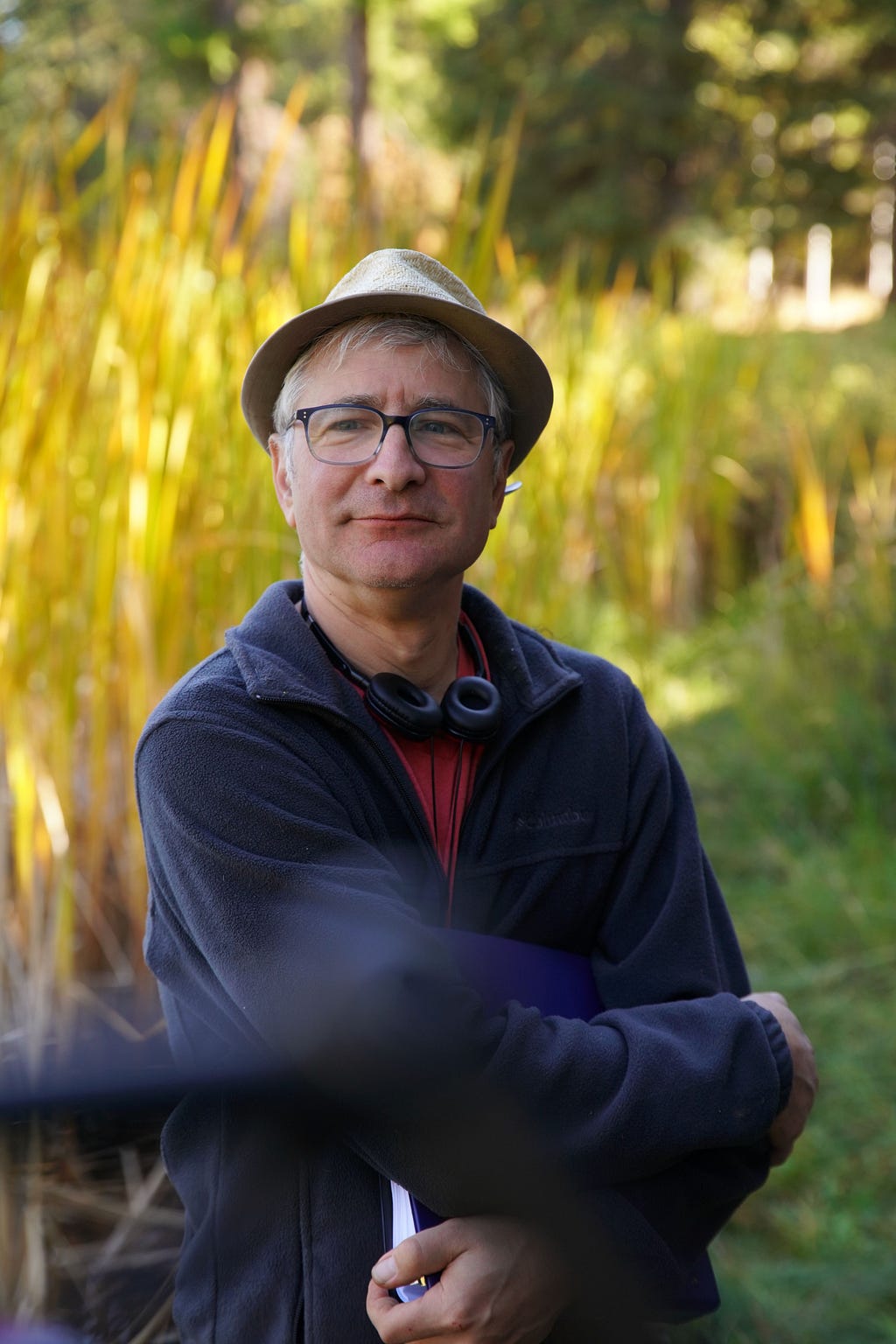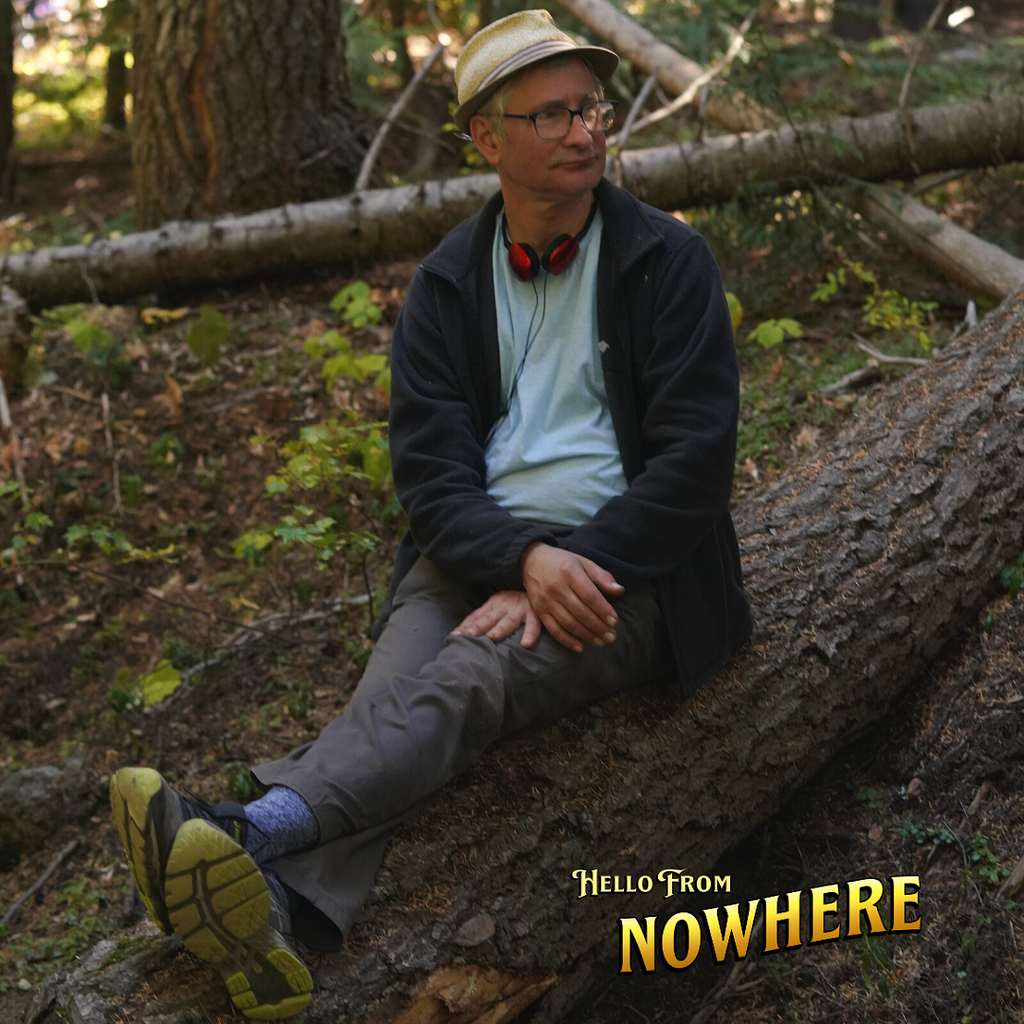
Production is HARD WORK! 12 hour days, at a minimum. This is hard enough if you’re crew, but if you’re directing or producing, it’s even harder, because you have so much more on the line. I caught a cold halfway through shooting Hello From Nowhere and directed for several days from inside a sleeping bag. You should prepare for the shoot like it’s a marathon: make sure you’re in tip-top shape.
As a part of our series called “5 Things I Wish Someone Told Me When I First Became A Filmmaker”, I had the distinct pleasure of interviewing Anthony Orkin.
Anthony Orkin is a Portland-based filmmaker. “Hello From Nowhere” is his second feature. His first feature, “Personal Sergeant”, starring Victor Argo, was distributed by Marvista Entertainment. A SAG-AFTRA member, Orkin has provided voices for shows and spots. His short films, such as “Sammy’s Measle”, “The Neighbor Hood” and “Stargazer”, have screened at a number of festivals. In addition to features, Anthony has edited TV shows, music videos and commercials. He lives in a big old house with his wife, two daughters, two cats, and, occasionally, a possum.
Thank you so much for joining us in this interview series! Our readers would love to get to know you a bit better. Can you tell us a bit of the ‘backstory’ of how you grew up?
I was born in New York City, where my father was vice president of Columbia Pictures. My mom had been a dancer in musicals. They were both very glamorous, and my childhood was filled with parties and movie stars. Then dad died, and everything went pouf. It was decay from that moment on. You ever see Sunset Boulevard? Imagine growing up in that house, with Norma Desmond for your mom. I’m amazed I made it through.
Can you share a story with us about what brought you to this specific career path?
After that upbringing, I had no choice. Show business is a powerful drug; I was born addicted.
Can you share the funniest or most interesting story that occurred to you in the course of your filmmaking career?
I’ve had two trees fall on camera. The first was during the hiking scene in Personal Sergeant, in the middle of Jerry Della Salla’s line. Crash! Unusable. Jerry later said, “of course, that was my best take.” The second was during the water-gathering scene in my most recent release, the romantic comedy-thriller Hello From Nowhere. That treefall is in the movie. No special effects there, folks.
Who are some of the most interesting people you have interacted with? What was that like? Do you have any stories?
I was a little boy, at a lunch party, sitting next to Peter Sellers. Peter nudged me and pointed to the guy sitting on my other side. Peter said, “you know, when he’s not looking, if you put salt into his water glass, it’s very funny.” Even at that age, I knew better. Another time, Peter almost bought me a solid gold wristwatch; my mother talked him out of it. All for the best; I’d probably have lost it.
None of us are able to achieve success without some help along the way. Is there a particular person who you are grateful towards who helped get you to where you are? Can you share a story about that?
Steve Oakes, my boss at Broadcast Arts and at Curious Pictures. Steve wasn’t just a director; he was head of the company. So while most directors raged about wanting this or that, Steve also had to watch the bottom line, balancing quality against profitability. Not easy! I was in some hairy situations with that guy, but he always remained calm and courteous. That’s real class.
Can you please give us your favorite “Life Lesson Quote”? Can you share how that was relevant to you in your life?
“First you block the shot. Then you light the shot. Then you shoot the shot.” Tom Lucak, a D.P., taught me that. I had, of course, just gotten the order wrong.
I am very interested in diversity in the entertainment industry. Can you share three reasons with our readers about why you think it’s important to have diversity represented in film and television? How can that potentially affect our culture?
1. It’s important to represent diversity because we live in a diverse world; if film is to be relevant to our lives, it has to accurately reflect our environment.
2. Diversity is the spice of life. If all we’re seeing on screen is white Anglo-Saxons, it’s boring. Plus, we’ll run out of stories to tell.
3. Movies aren’t just entertainment, they’re education. I may not have been in a black man’s house, but I’ve seen one on TV. Not as good as the real thing, but at least it’s a glimpse into the lives of others. And that broadens our experience, albeit vicariously. Hopefully that makes our culture more tolerant of differences.
What are some of the most interesting or exciting projects you are working on now?
Two things: I’m writing my second novel, which is about memory. It’s set in Berlin, around the fall of the Wall. Lots of stuff about the Stasi, which is fun to research. Glad I didn’t live it. Number two, I’m writing a musical comedy, for the stage. And no, it’s not Marmaduke Murgatroyd (you gotta see Hello From Nowhere to get that).
Which aspect of your work makes you most proud? Can you explain or give a story?
When I was shooting my first movie, Personal Sergeant, I was sure I was presiding over a disaster. I nearly pulled the plug on the whole thing, halfway through. I didn’t tell anybody that until the wrap party. A crew member responded, “we had no idea, you seemed so calm.” At that moment, I had channeled Steve Oakes: grace under pressure. Didn’t know I had it in me.

Ok super. Here is the main question of our interview. What are your “5 things I wish someone told me when I first started” and why. Please share a story or example for each.
- Production is HARD WORK! 12 hour days, at a minimum. This is hard enough if you’re crew, but if you’re directing or producing, it’s even harder, because you have so much more on the line. I caught a cold halfway through shooting Hello From Nowhere and directed for several days from inside a sleeping bag. You should prepare for the shoot like it’s a marathon: make sure you’re in tip-top shape.
- Don’t be too precious about the script. The last night of the Personal Sergeant shoot, Jon Budinoff ignored half my dialogue and improvised instead. He actually threw a handful of coins at Victor Argo (“money for your funeral”, he said)! I would never have thought of that. Some of the best stuff you get will be improvised.
- Learn to love the process. It’s gotta be good, even when it’s bad, because it’s going to be bad so, so often. Everybody’s going to try to talk you out of this insanity, and you’re going to have to talk them into it. You’re going to have to talk yourself into it. It’s like jumping off a high diving board: you have to commit whole-heartedly. When an actor I wanted turned me down and skewered my script, I nearly passed out after reading the email; but as I lay there, on the floor, recovering, I thought, “wow! This is show business!”
- Making movies is a very social occupation. Watching movies is very anti-social. So if you want to make a movie because you like sitting silently in a dark room, be prepared to go way outside your comfort zone. I was an editor for years; my back was to my clients, my eyes were on the keyboard. I thought I knew what directing was. HA! Trying to de-fuse an argument between a stylist and a homophobic actor in a hospital stairway — I needed to be a psychiatrist, not a technician.
- Making the movie is only half the battle; then you have to sell it. I finished Hello From Nowhere over two years ago. Since then, we’ve been designing the artwork, doing the trailer, the website, the social media pages, the press releases, hiring the first distribution company (which held it for a year and then dumped it — you know who you are), hiring the second distribution company, doing all the technical deliverables as well as the legal documents, and so on. Be ready for this, save some money for it.
When you create a film, which stakeholders have the greatest impact on the artistic and cinematic choices you make? Is it the viewers, the critics, the financiers, or your own personal artistic vision? Can you share a story with us or give an example about what you mean?
Who is your master? Whom will you allow to dictate? Your actors will have opinions. Your crew will, too. You may hear some whispering behind your back as you call for another take, this one with feeling. I once had an actress throw my script on the street and jump on it. I backed off. If I’d been paying her, I probably wouldn’t have. So much of this is money.
You are a person of great influence. If you could start a movement that would bring the most amount of good to the most amount of people, what would that be? You never know what your idea can trigger. 🙂
Trading places. All over the world — red state, blue state, democracy, socialist dystopia, whatever — the vast majority of the people I’ve met have been nice and reasonable. Yet everybody seems to hate the folks ‘on the other side’. If we swapped people more often, we’d get to know each other better. Then maybe we’d be less partisan.
We are very blessed that some of the biggest names in Business, VC funding, Sports, and Entertainment read this column. Is there a person in the world, or in the US whom you would love to have a private breakfast or lunch with, and why? He or she might see this. 🙂
Taika Waititi. He blends humor with depth. Plus I’ve got a part I’d like him to play.
How can our readers further follow you online?
www.hellofromnowhere.net and www.anthonyorkin.com
This was very meaningful, thank you so much! We wish you continued success!
Anthony Orkin of Crunchy Pictures: 5 Things I Wish Someone Told Me When I First Became A Filmmaker was originally published in Authority Magazine on Medium, where people are continuing the conversation by highlighting and responding to this story.
